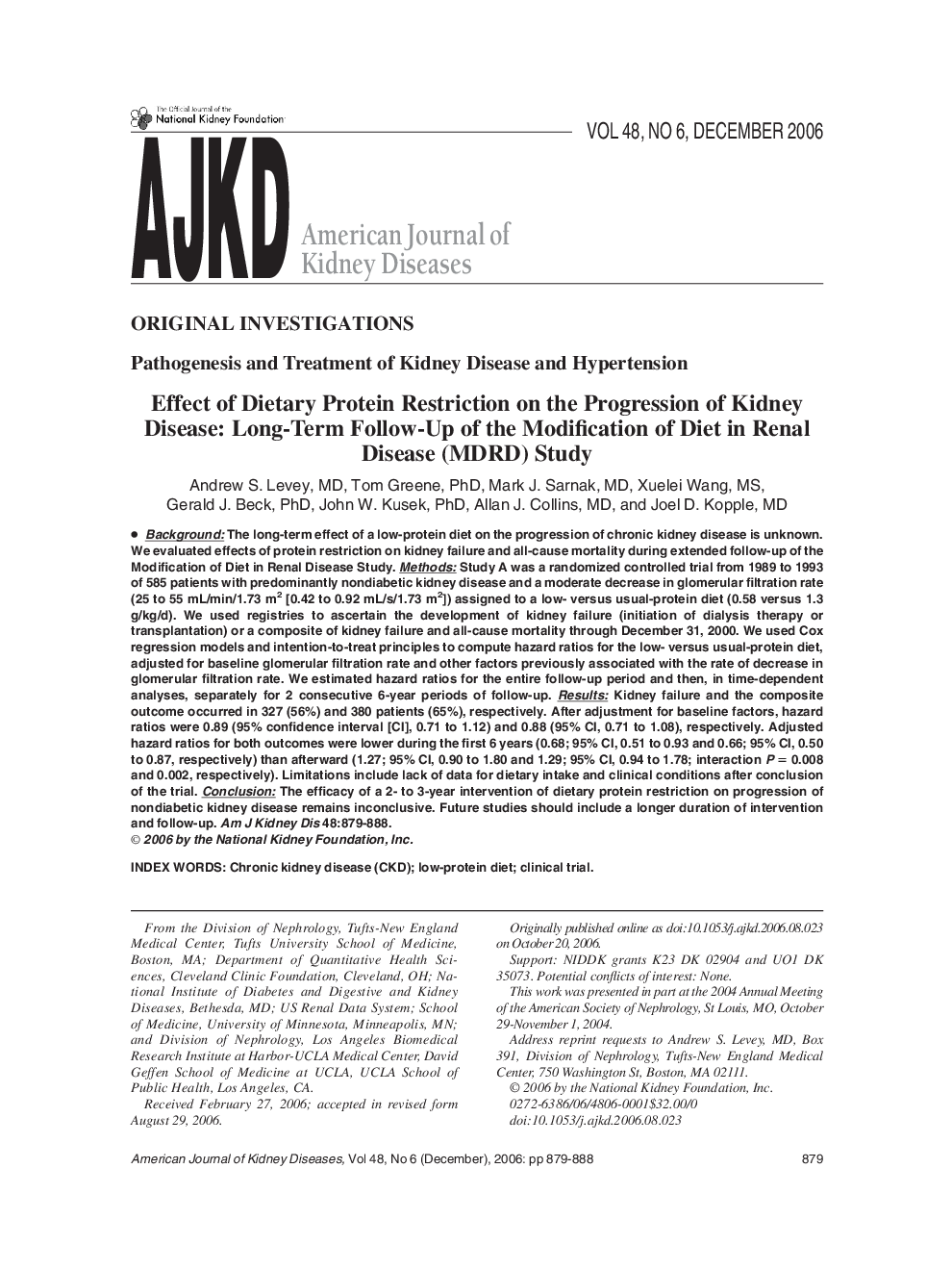| کد مقاله | کد نشریه | سال انتشار | مقاله انگلیسی | نسخه تمام متن |
|---|---|---|---|---|
| 3851404 | 1598379 | 2006 | 10 صفحه PDF | دانلود رایگان |
عنوان انگلیسی مقاله ISI
Effect of Dietary Protein Restriction on the Progression of Kidney Disease: Long-Term Follow-Up of the Modification of Diet in Renal Disease (MDRD) Study
دانلود مقاله + سفارش ترجمه
دانلود مقاله ISI انگلیسی
رایگان برای ایرانیان
کلمات کلیدی
موضوعات مرتبط
علوم پزشکی و سلامت
پزشکی و دندانپزشکی
بیماریهای کلیوی
پیش نمایش صفحه اول مقاله

چکیده انگلیسی
Background: The long-term effect of a low-protein diet on the progression of chronic kidney disease is unknown. We evaluated effects of protein restriction on kidney failure and all-cause mortality during extended follow-up of the Modification of Diet in Renal Disease Study. Methods: Study A was a randomized controlled trial from 1989 to 1993 of 585 patients with predominantly nondiabetic kidney disease and a moderate decrease in glomerular filtration rate (25 to 55 mL/min/1.73 m2 [0.42 to 0.92 mL/s/1.73 m2]) assigned to a low- versus usual-protein diet (0.58 versus 1.3 g/kg/d). We used registries to ascertain the development of kidney failure (initiation of dialysis therapy or transplantation) or a composite of kidney failure and all-cause mortality through December 31, 2000. We used Cox regression models and intention-to-treat principles to compute hazard ratios for the low- versus usual-protein diet, adjusted for baseline glomerular filtration rate and other factors previously associated with the rate of decrease in glomerular filtration rate. We estimated hazard ratios for the entire follow-up period and then, in time-dependent analyses, separately for 2 consecutive 6-year periods of follow-up. Results: Kidney failure and the composite outcome occurred in 327 (56%) and 380 patients (65%), respectively. After adjustment for baseline factors, hazard ratios were 0.89 (95% confidence interval [CI], 0.71 to 1.12) and 0.88 (95% CI, 0.71 to 1.08), respectively. Adjusted hazard ratios for both outcomes were lower during the first 6 years (0.68; 95% CI, 0.51 to 0.93 and 0.66; 95% CI, 0.50 to 0.87, respectively) than afterward (1.27; 95% CI, 0.90 to 1.80 and 1.29; 95% CI, 0.94 to 1.78; interaction P = 0.008 and 0.002, respectively). Limitations include lack of data for dietary intake and clinical conditions after conclusion of the trial. Conclusion: The efficacy of a 2- to 3-year intervention of dietary protein restriction on progression of nondiabetic kidney disease remains inconclusive. Future studies should include a longer duration of intervention and follow-up.
ناشر
Database: Elsevier - ScienceDirect (ساینس دایرکت)
Journal: American Journal of Kidney Diseases - Volume 48, Issue 6, December 2006, Pages 879-888
Journal: American Journal of Kidney Diseases - Volume 48, Issue 6, December 2006, Pages 879-888
نویسندگان
Andrew S. MD, Tom PhD, Mark J. MD, Xuelei MS, Gerald J. PhD, John W. PhD, Allan J. MD, Joel D. MD,